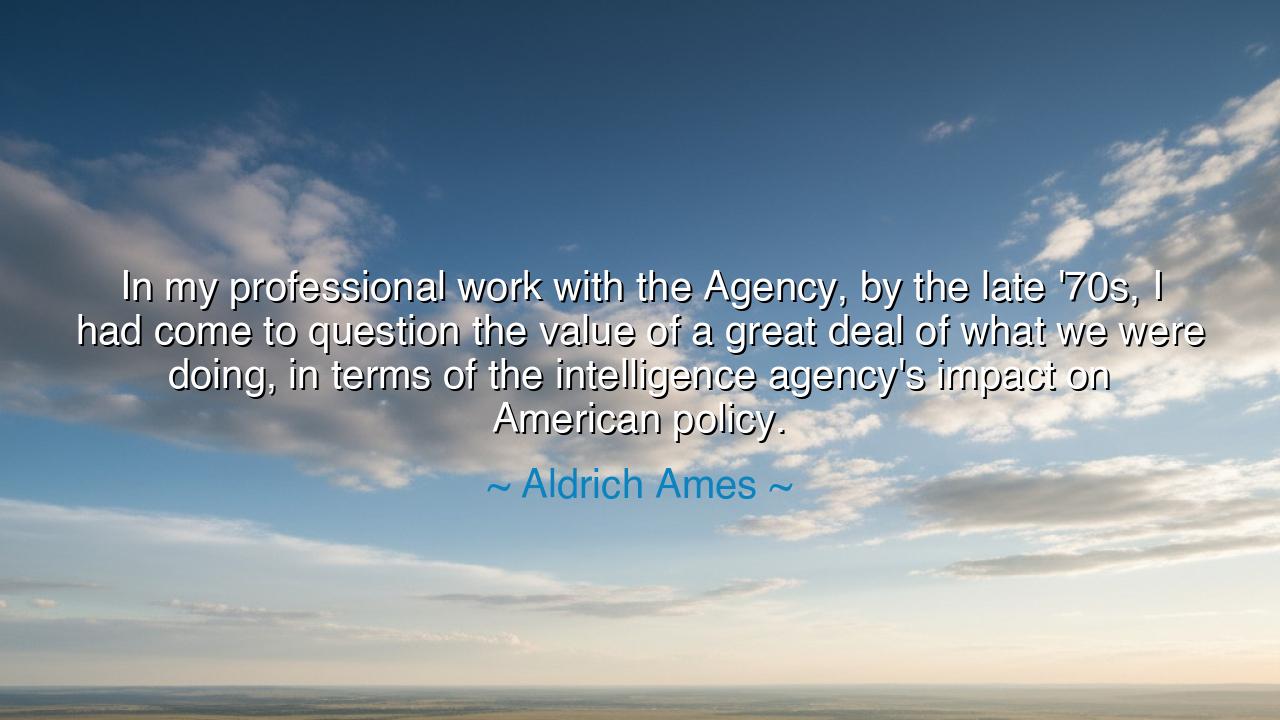
In my professional work with the Agency, by the late '70s, I had
In my professional work with the Agency, by the late '70s, I had come to question the value of a great deal of what we were doing, in terms of the intelligence agency's impact on American policy.






When Aldrich Ames confessed, “In my professional work with the Agency, by the late '70s, I had come to question the value of a great deal of what we were doing, in terms of the intelligence agency's impact on American policy,” he was not merely recalling a moment of doubt—he was unveiling the eternal struggle between duty and conscience, between the mask of service and the whisper of truth within the heart. His words emerge from a time steeped in secrecy, when the Cold War cast long shadows over nations and men alike. Yet, beneath the surface of politics and espionage, they echo a question as old as civilization itself: What is the worth of one’s labor if it no longer serves justice or wisdom?
Ames, once an officer within the Central Intelligence Agency, stood within the inner chambers of power—an observer of hidden wars and invisible influence. By the late 1970s, his faith in the moral foundation of his work began to erode. He saw decisions that served interests rather than ideals, intelligence gathered not for truth, but for leverage. The machinery of secrecy, built to defend liberty, seemed to him to drift toward manipulation and deceit. His questioning, though born of awareness, would one day curdle into betrayal; yet at its root lies a timeless lesson: that every man who serves a great institution must one day face the mirror and ask, “Do I still serve what is right—or merely what is powerful?”
This reflection recalls the fate of Marcus Junius Brutus, who once served under Julius Caesar. Brutus was no ordinary conspirator; he was a man torn between loyalty and principle. When Caesar’s ambition threatened the republic, Brutus asked himself whether obedience to a leader could outweigh obedience to Rome’s ideals. In that crucible of conscience, he chose the harder path. His act—though tragic and flawed—was born from the same fire that kindled in Ames: the realization that power without virtue corrupts the soul of both the ruler and the servant. History teaches us that when duty demands silence against injustice, the truly awakened heart begins to question its own purpose.
Ames’s words, though stained by later treachery, still carry a dark wisdom. For even the fallen may speak truths the righteous ignore. He had glimpsed the emptiness that can hide behind the banners of patriotism, the illusion of moral superiority that great nations often wear to justify unseen actions. His questioning reminds us that intelligence without integrity, or power without conscience, is a sword turned inward. When institutions forget their moral compass, they may achieve victories of strategy—but lose the war of the soul.
The ancients would say that the first duty of a servant is not obedience, but understanding. A man must know why he serves before he can serve well. Blind loyalty, though praised by kings and commanders, is a form of cowardice disguised as faithfulness. Ames’s awakening—however misdirected in its outcome—was the cry of one who saw the hollow beneath the grandeur. It is the cry of every soul that labors under a system which has forgotten its own promise. To question is not betrayal; to betray without principle is. Yet questioning, done with courage and clarity, is the birthplace of reform.
Let every listener take this to heart: never surrender the power to think, even in the face of authority. The mind that stops questioning becomes a tool, and the soul that ceases to discern becomes a shadow. In your work, your service, your nation—whatever the cause—ask yourself not only what you do, but why you do it. For truth does not dwell in orders received, but in motives examined. The world has no shortage of servants; it starves for servants of conscience.
Thus, the lesson of Ames’s reflection—though spoken from a man who fell—is a warning to the generations that follow: beware the silence of unquestioning service. Power will tempt you to believe that loyalty is virtue and doubt is weakness. But the wise know that to question is to protect the very thing worth serving. Let your loyalty be to truth above all banners, and your service to the light that power itself too often forgets. For in the end, it is not the agency, the government, or the empire that defines your worth—it is the integrity of your soul, and the courage with which you guard it.






AAdministratorAdministrator
Welcome, honored guests. Please leave a comment, we will respond soon